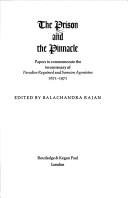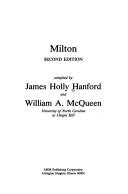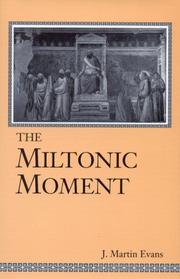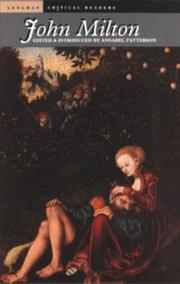| Listing 1 - 10 of 138 | << page >> |
Sort by
|

ISBN: 0710075774 Year: 1973 Publisher: London
Abstract | Keywords | Export | Availability | Bookmark
 Loading...
Loading...Choose an application
- Reference Manager
- EndNote
- RefWorks (Direct export to RefWorks)
Milton, John --- Milton, John. --- Milṭan, Jān, --- Milʹton, Dzhon, --- Милтон, Джон, --- Miltūn, Zhūn, --- Miltonus, Joannes, --- J. M. --- M., J. --- Milʹton, Īoann, --- Milton, Gioanni, --- Milton, Giovanni, --- מילטאן, יאהאן --- מילטאן, יוחנן --- מילטון, ג׳והן --- מלטן, יוחנן
Book
ISBN: 0191636444 1283986566 0191740756 0199698708 9780191740756 9780199698707 9781283986564 9780191636448 Year: 2012 Publisher: Oxford Oxford University Press
Abstract | Keywords | Export | Availability | Bookmark
 Loading...
Loading...Choose an application
- Reference Manager
- EndNote
- RefWorks (Direct export to RefWorks)
The experimental and diverse writing of John Milton's early career offers tanatalising evidence of a precocious and steadily ripening author. This book explores these writings, including 'Lycidas' and 'The Passion'.
Milton, John, --- Milṭan, Jān, --- Milʹton, Dzhon, --- Милтон, Джон, --- Miltūn, Zhūn, --- Miltonus, Joannes, --- J. M. --- M., J. --- Milʹton, Īoann, --- Milton, Gioanni, --- Milton, Giovanni, --- מילטאן, יאהאן --- מילטאן, יוחנן --- מילטון, ג׳והן --- מלטן, יוחנן --- Criticism and interpretation.

ISBN: 0882955713 Year: 1979 Publisher: Arlington Heights, Ill.
Abstract | Keywords | Export | Availability | Bookmark
 Loading...
Loading...Choose an application
- Reference Manager
- EndNote
- RefWorks (Direct export to RefWorks)
Milton, John --- Milṭan, Jān, --- Milʹton, Dzhon, --- Милтон, Джон, --- Miltūn, Zhūn, --- Miltonus, Joannes, --- J. M. --- M., J. --- Milʹton, Īoann, --- Milton, Gioanni, --- Milton, Giovanni, --- מילטאן, יאהאן --- מילטאן, יוחנן --- מילטון, ג׳והן --- מלטן, יוחנן --- Bibliography. --- English literature

ISBN: 0813147549 081317015X 9780813170152 0813120608 9780813120607 0813188288 9780813188287 9780813147543 Year: 1998 Publisher: Lexington University Press of Kentucky
Abstract | Keywords | Export | Availability | Bookmark
 Loading...
Loading...Choose an application
- Reference Manager
- EndNote
- RefWorks (Direct export to RefWorks)
Milton's poems invariably depict the decisive instant in a story, a moment of crisis that takes place just before the action undergoes a dramatic change of course. Such instants look backward to a past that is about to be superseded or repudiated and forward, at the same time, to a future that will immediately begin to unfold. Martin Evans identifies this moment of transition as ""the Miltonic Moment."" This provocative new study focuses primarily on three of Milton's best known early poems: ""On the Morning of Christ's Nativity,"" ""A Mask Presented at Ludlow Castle (Comus),"" and ""Lycidas."
Renaissance --- Milton, John, --- Milṭan, Jān, --- Milʹton, Dzhon, --- Милтон, Джон, --- Miltūn, Zhūn, --- Miltonus, Joannes, --- J. M. --- M., J. --- Milʹton, Īoann, --- Milton, Gioanni, --- Milton, Giovanni, --- מילטאן, יאהאן --- מילטאן, יוחנן --- מילטון, ג׳והן --- מלטן, יוחנן --- Criticism and interpretation.
Book
ISBN: 1139542583 1108057357 Year: 1900 Publisher: Place of publication not identified : Cambridge : publisher not identified, Cambridge University Press
Abstract | Keywords | Export | Availability | Bookmark
 Loading...
Loading...Choose an application
- Reference Manager
- EndNote
- RefWorks (Direct export to RefWorks)
Ranking among the greatest of all English poets, John Milton (1608-74) was an influential thinker during a particularly volatile period in his nation's history. His supreme masterpiece Paradise Lost forms one of the pillars of English literature. The literary scholar and historian Sir Walter Alexander Raleigh (1861-1922) was educated at University College London and King's College, Cambridge. Following posts at Liverpool and Glasgow, he was appointed Professor of English Literature at Oxford University, where he also served as an adviser to the Clarendon Press. This work, first published in 1900, is based upon lectures he gave the previous year as Clark Lecturer in English Literature at Trinity College, Cambridge. Admired by the critic William Empson, it is a penetrating study of the great poet and contains a biographical sketch as well as lucid analyses of Milton's use of language and its significant influence.
Milton, John, --- Criticism and interpretation. --- Milṭan, Jān, --- Milʹton, Dzhon, --- Милтон, Джон, --- Miltūn, Zhūn, --- Miltonus, Joannes, --- J. M. --- M., J. --- Milʹton, Īoann, --- Milton, Gioanni, --- Milton, Giovanni, --- מילטאן, יאהאן --- מילטאן, יוחנן --- מילטון, ג׳והן --- מלטן, יוחנן
Book
ISBN: 1316532178 1107446643 1316530493 1107059852 1107664799 Year: 2016 Publisher: New York : Cambridge University Press,
Abstract | Keywords | Export | Availability | Bookmark
 Loading...
Loading...Choose an application
- Reference Manager
- EndNote
- RefWorks (Direct export to RefWorks)
In The Value of Milton, leading critic John Leonard explores the writings of John Milton from his early poetry to his major prose. Milton's work includes one of the most difficult and challenging texts in the English literary canon, yet he remains impressively popular with general readers. Leonard demonstrates why Milton has enduring value for our own time, both as a defender of political liberty and as a poet of sublimity and terror who also exhibits moments of genuine humanity and compassion. A poet divided against himself, Milton offers different rewards to different readers. The Value of Milton examines not only the significance of his most celebrated verse but also the function of biblical allegory, classical culture, and the moods, voice and language that give Milton's writings their perennial appeal.
Milton, John, --- Milṭan, Jān, --- Milʹton, Dzhon, --- Милтон, Джон, --- Miltūn, Zhūn, --- Miltonus, Joannes, --- J. M. --- M., J. --- Milʹton, Īoann, --- Milton, Gioanni, --- Milton, Giovanni, --- מילטאן, יאהאן --- מילטאן, יוחנן --- מילטון, ג׳והן --- מלטן, יוחנן --- Criticism and interpretation. --- Influence.
Book
ISBN: 1849663327 1474245129 1849664234 1849664218 9781849664219 9781849664233 Year: 2011 Publisher: London : Bloomsbury Academic,
Abstract | Keywords | Export | Availability | Bookmark
 Loading...
Loading...Choose an application
- Reference Manager
- EndNote
- RefWorks (Direct export to RefWorks)
"Why was Milton so important to the Romantics? How did 'Milton the Regicide', a man often regarded in his lifetime as a dangerous traitor and heretic, become 'the Sublime Milton'? the late eighteenth century saw a sudden and to date almost undocumented craze for all things Miltonic, the symptoms of which included the violation of his grave and the sale of his hair and bones as relics, the republication of all his works including his political tracts in unprecedented numbers, the appearance of the poet in the works, letters, dreams and visions of all the major British Romantic poets and even frequent reports of hauntings by his ghost. Drawing on the traditions of cultural, intellectual and bibliographic history as well as recent trends in literary scholarship on the romantic period, Joseph Crawford explores the dramatic shift in Milton's cultural status after 1790. He builds on a now significant literature on Milton's legacy to the Romantic poets, uncovering the cultural historical background against which the Romantics and their contemporaries encountered and interacted with Milton's reputation and works."--Bloomsbury Publishing.
Milton, John, --- Criticism and interpretation. --- Milṭan, Jān, --- Milʹton, Dzhon, --- Милтон, Джон, --- Miltūn, Zhūn, --- Miltonus, Joannes, --- J. M. --- M., J. --- Milʹton, Īoann, --- Milton, Gioanni, --- Milton, Giovanni, --- מילטאן, יאהאן --- מילטאן, יוחנן --- מילטון, ג׳והן --- מלטן, יוחנן
Book
ISBN: 9789462701878 9789461662958 9462701873 9461662955 Year: 2019 Publisher: Leuven
Abstract | Keywords | Export | Availability | Bookmark
 Loading...
Loading...Choose an application
- Reference Manager
- EndNote
- RefWorks (Direct export to RefWorks)
"John Milton holds an impressive place within the rich tradition of neo-Latin epistolography. His 'Epistolae Familiares' and uncollected letters paint an invigorating portrait of the artist as a young man, offering insight into his reading programme, his views on education, friendship, poetry, his relations with continental literati, his blindness, and his role as Latin Secretary. This edition presents a modernised Latin text and a facing English translation, complemented by a detailed introduction and a comprehensive commentary. Situating Milton's letters in relation to the classical, pedagogical, neo-Latin, and vernacular contexts at the heart of their composition, it presents fresh evidence in regard to Milton's relationships with the Italian philologist Benedetto Buonmattei, the Greek humanist Leonard Philaras, the radical pastor Jean de Labadie, and the German diplomat Peter Heimbach. It also announces several new discoveries, most notably a manuscript of Henry Oldenburg's transcription of 'Ep. Fam. 25'. This volume fills an important gap in Milton scholarship, and will prove of particular use to Milton scholars, students, philologists, neo-Latinists, and those interested in the humanist reinvention of the epistolographic tradition."--Publisher's website
Classical Latin literature --- Milton, John --- anno 1600-1699 --- Neulatein. --- Milton, John, --- Neulatein --- Neulateinisch --- Latein --- Milton, Joannis --- Milton, Jan --- Milton, J. --- Mil'ton, Džon --- Milʹton, D. --- Milton --- Miltoni, Jon --- Miltonus Anglus, Johannes --- Miltonus, Johannes --- Miltonius, Johannes --- Miltonius, Joannes --- Polypragmaticus, Johannes --- French, Joseph Milton --- Milton, Johann --- Milton, Joannes --- Milton, Giovanni --- Miltonus, Joannis --- Miltonus, Joannes --- M., J. (John Milton) --- Milton, Gioanni --- J. M. (John Milton) --- Schriftsteller --- Philosoph --- London --- 1608-1674 --- 09.12.1608-10.11.1674 --- J. M. --- M., J. --- Milṭan, Jān, --- Milʹton, Dzhon, --- Milton, Gioanni, --- Milton, Giovanni, --- Milʹton, Īoann, --- Miltonus, Joannes, --- Miltūn, Zhūn, --- Милтон, Джон, --- מילטאן, יאהאן --- מילטאן, יוחנן --- מילטון, ג׳והן --- מלטן, יוחנן
Multi
ISBN: 9781107021501 9781139108973 9781139518857 1139518852 1280774177 9781280774171 1139108972 1107021502 1107231566 1139508288 9786613684943 1139517929 1139515349 1139514423 113951699X Year: 2012 Publisher: Cambridge [Englnad] New York Cambridge University Press
Abstract | Keywords | Export | Availability | Bookmark
 Loading...
Loading...Choose an application
- Reference Manager
- EndNote
- RefWorks (Direct export to RefWorks)
Challenging the conventional view of John Milton as an iconoclast who spoke only to a 'fit audience though few', Daniel Shore argues that Milton was a far more pragmatic writer than previous scholarship has recognized. Summoning evidence from nearly all of his works - poetry and prose alike - Shore asserts that Milton distanced himself from the prescriptions of classical rhetoric to develop new means of persuasion suited to an age distrustful of traditional eloquence. Shore demonstrates that Milton's renunciation of agency, audience, purpose and effect in the prose tracts leads not to quietism or withdrawal, but rather to a reasserted investment in public debate. Shore reveals a writer who is committed to persuasion and yet profoundly critical of his own persuasive strategies. An innovative contribution to the field, this text will appeal to scholars of Milton, seventeenth-century literature, Renaissance literature and the history and theory of rhetoric.
Milton, John --- Literary criticism --- European --- English, Irish, Scottish, Welsh. --- Milton, John, --- Criticism and interpretation. --- Rhetoric --- Language and languages --- Speaking --- Authorship --- Expression --- Literary style --- History --- Milṭan, Jān, --- Milʹton, Dzhon, --- Милтон, Джон, --- Miltūn, Zhūn, --- Miltonus, Joannes, --- J. M. --- M., J. --- Milʹton, Īoann, --- Milton, Gioanni, --- Milton, Giovanni, --- מילטאן, יאהאן --- מילטאן, יוחנן --- מילטון, ג׳והן --- מלטן, יוחנן --- Arts and Humanities --- Literature

ISBN: 0582045398 0582045509 9780582045392 9781315846217 9781317900184 9781317900191 Year: 1992 Publisher: London Longman
Abstract | Keywords | Export | Availability | Bookmark
 Loading...
Loading...Choose an application
- Reference Manager
- EndNote
- RefWorks (Direct export to RefWorks)
Milton, John --- Milton, John, --- Criticism and interpretation --- Critique et interprétation --- Critique et interprétation --- Criticism and interpretation. --- Milṭan, Jān, --- Milʹton, Dzhon, --- Милтон, Джон, --- Miltūn, Zhūn, --- Miltonus, Joannes, --- J. M. --- M., J. --- Milʹton, Īoann, --- Milton, Gioanni, --- Milton, Giovanni, --- מילטאן, יאהאן --- מילטאן, יוחנן --- מילטון, ג׳והן --- מלטן, יוחנן
| Listing 1 - 10 of 138 | << page >> |
Sort by
|

 Search
Search Feedback
Feedback About UniCat
About UniCat  Help
Help News
News